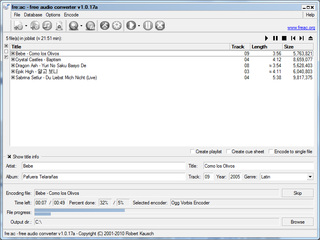Related Research Articles

A CD ripper, CD grabber, or CD extractor is software that rips raw digital audio in Compact Disc Digital Audio (CD-DA) format tracks on a compact disc to standard computer sound files, such as WAV or MP3.

Media player software is a type of application software for playing multimedia computer files like audio and video files. Media players commonly display standard media control icons known from physical devices such as tape recorders and CD players, such as play, pause, fastforward (⏩️), rewind (⏪), and stop buttons. In addition, they generally have progress bars, which are sliders to locate the current position in the duration of the media file.
A music tracker is a type of music sequencer software for creating music. The music is represented as discrete musical notes positioned in several channels at chronological positions on a vertical timeline. A music tracker's user interface is traditionally number based. Notes, parameter changes, effects and other commands are entered with the keyboard into a grid of fixed time slots as codes consisting of letters, numbers and hexadecimal digits. Separate patterns have independent timelines; a complete song consists of a master list of repeated patterns.
Scream Tracker is a tracker. It was created by Psi, one of the founders of the Finnish demogroup Future Crew. It was written in C and assembly language.
XM, standing for "extended module", is an audio file type introduced by Triton's FastTracker 2. XM introduced multisampling-capable instruments with volume and panning envelopes, sample looping and basic pattern compression. It also expanded the available effect commands and channels, added 16-bit sample support, and offered an alternative frequency table for portamentos.

A playlist is a list of video or audio files that can be played back on a media player either sequentially or in a shuffled order. In its most general form, an audio playlist is simply a list of songs, but sometimes a loop. The term has several specialized meanings in the realms of television broadcasting, radio broadcasting and personal computers.

VLC media player is a free and open-source, portable, cross-platform media player software and streaming media server developed by the VideoLAN project. VLC is available for desktop operating systems and mobile platforms, such as Android, iOS and iPadOS. VLC is also available on digital distribution platforms such as Apple's App Store, Google Play, and Microsoft Store.

OpenMPT is an open-source audio module tracker for Windows. It was previously called ModPlug Tracker, and was first released by Olivier Lapicque in September 1997.
FastTracker 2 is a music tracker created by Fredrik "Mr. H" Huss and Magnus "Vogue" Högdahl, two members of the demogroup Triton which set about releasing their own tracker after breaking into the scene in 1992 and winning several demo competitions. The source code of FastTracker 2 is written in Pascal using Borland Pascal 7 and TASM. The program works natively under MS-DOS.
MOD is a computer file format used primarily to represent music, and was the first module file format. MOD files use the “.MOD” file extension, except on the Amiga which doesn't rely on filename extensions; instead, it reads a file's header to determine filetype. A MOD file contains a set of instruments in the form of samples, a number of patterns indicating how and when the samples are to be played, and a list of what patterns to play in what order.

The Gravis UltraSound or GUS is a sound card for the IBM PC compatible system platform, made by Canada-based Advanced Gravis Computer Technology Ltd. It was very popular in the demoscene during the 1990s.

Module file is a family of music file formats originating from the MOD file format on Amiga systems used in the late 1980s. Those who produce these files and listen to them form the worldwide MOD scene, a part of the demoscene subculture.
MO3 is a tracker module file format developed by Ian Luck for the BASSMOD engine. MO3 files contain samples encoded in the MP3 or Ogg Vorbis formats, rather than straight PCM samples. This results in reduced file size for the module, while maintaining almost identical audio quality. Lossless audio encoding is also supported, for samples that do not compress well with lossy encoding.
The following comparison of audio players compares general and technical information for a number of software media player programs. For the purpose of this comparison, "audio players" are defined as any media player explicitly designed to play audio files, with limited or no support for video playback. Multi-media players designed for video playback, which can also play music, are included under comparison of video player software.
Impulse Tracker is a multi-track music tracker. Originally released in 1995 by Jeffrey Lim as freeware with commercial extensions, it was one of the last tracker programs for the DOS platform.
This article deals with music software created for the Amiga line of computers and covers the AmigaOS operating system and its derivates AROS and MorphOS and is a split of main article Amiga software. See also related articles Amiga productivity software, Amiga programming languages, Amiga Internet and communications software and Amiga support and maintenance software for other information regarding software that run on Amiga.

AIMP is a freeware audio player for Windows, Android and Linux, originally developed by Russian developer Artem Izmaylov. It supports a variety of audio codecs, and includes tools to convert audio files and edit their metadata, as well as the capability of installing user-made skins and plugins.
References
- 1 2 Kameñar, Vladimir (2021). Demoscene, el Arte Digital (in Spanish). Colombia: CelerSMS. p. 31. ISBN 978-958-53602-1-1. OCLC 1269270953.
- ↑ Wesley, Dan; Wesley, Judith (1997). Web Developer's Marketplace. Coriolis Group. p. 268. ISBN 978-1576101780.
- ↑ "OpenMPT 1.28.01.00 released". 23 December 2018.
- ↑ "VLC - Features - VideoLAN".
- ↑ "AIMP".
- ↑ "JetAudio".